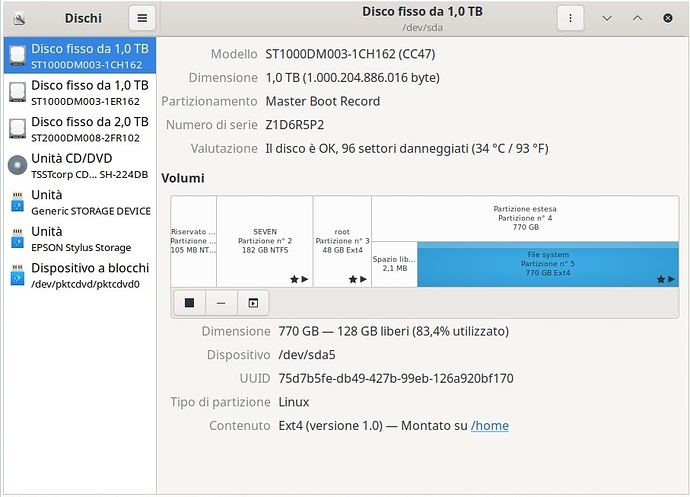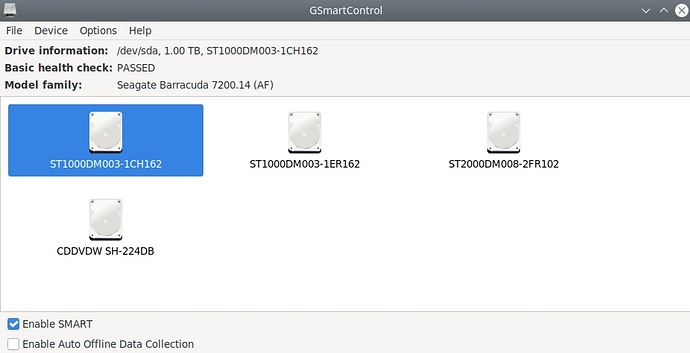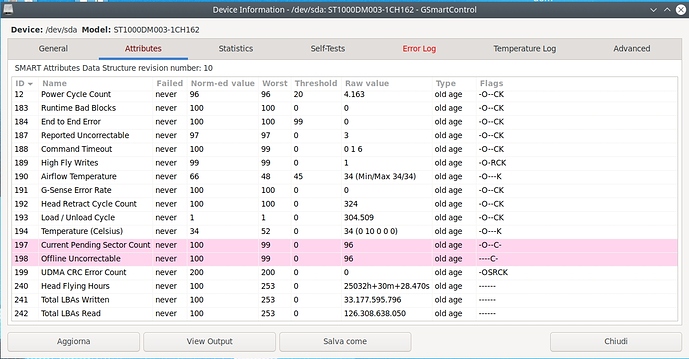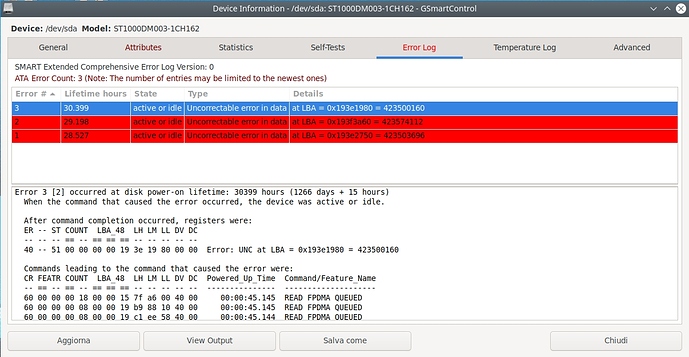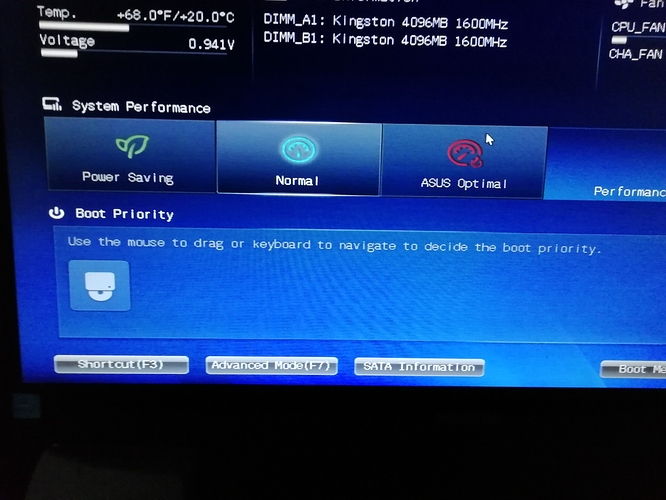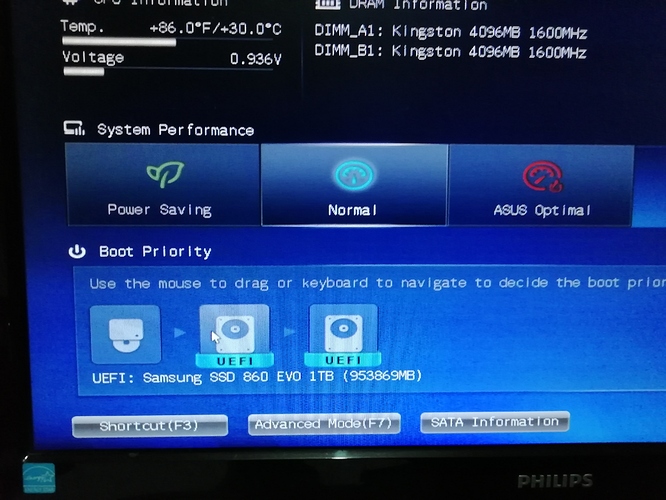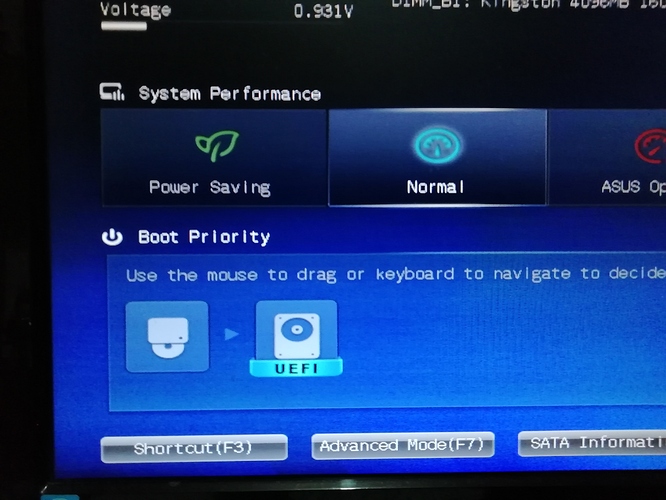Salve a tutti,
questa mattina, accendendo il computer, ho ottenuto un kernel panic con altre diciture. Purtroppo non ho pensato a scattare una foto del messaggio e pressato da una necessità ho riavviato con 7finestre. Ho successivamente riavviato su Fedora ed è partito automaticamente un chkdsk dopodiché Fedora si è avviata normalmente. Utilizzando DiskInfo / GSmartControl ottengo:
Sono errori “normali” dovuti all’età del disco o bisogna intervenire con urgenza? Nel qual caso mi consigliereste un piano d’azione?
Allego anche il log di GSmartControl:
smartctl 7.2 2021-01-17 r5170 [x86_64-linux-5.10.8-100.fc32.x86_64] (local build)
Copyright © 2002-20, Bruce Allen, Christian Franke, www.smartmontools.org
=== START OF INFORMATION SECTION ===
Model Family: Seagate Barracuda 7200.14 (AF)
Device Model: ST1000DM003-1CH162
Serial Number: Z1D6R5P2
LU WWN Device Id: 5 000c50 064d0977e
Firmware Version: CC47
User Capacity: 1,000,204,886,016 bytes [1.00 TB]
Sector Sizes: 512 bytes logical, 4096 bytes physical
Rotation Rate: 7200 rpm
Form Factor: 3.5 inches
Device is: In smartctl database [for details use: -P show]
ATA Version is: ACS-2, ACS-3 T13/2161-D revision 3b
SATA Version is: SATA 3.1, 6.0 Gb/s (current: 1.5 Gb/s)
Local Time is: Sun Jan 31 09:23:46 2021 CET
SMART support is: Available - device has SMART capability.
SMART support is: Enabled
AAM feature is: Unavailable
APM level is: 128 (minimum power consumption without standby)
Rd look-ahead is: Enabled
Write cache is: Enabled
DSN feature is: Unavailable
ATA Security is: Disabled, NOT FROZEN [SEC1]
=== START OF READ SMART DATA SECTION ===
SMART overall-health self-assessment test result: PASSED
General SMART Values:
Offline data collection status: (0x00) Offline data collection activity
was never started.
Auto Offline Data Collection: Disabled.
Self-test execution status: ( 0) The previous self-test routine completed
without error or no self-test has ever
been run.
Total time to complete Offline
data collection: ( 575) seconds.
Offline data collection
capabilities: (0x73) SMART execute Offline immediate.
Auto Offline data collection on/off support.
Suspend Offline collection upon new
command.
No Offline surface scan supported.
Self-test supported.
Conveyance Self-test supported.
Selective Self-test supported.
SMART capabilities: (0x0003) Saves SMART data before entering
power-saving mode.
Supports SMART auto save timer.
Error logging capability: (0x01) Error logging supported.
General Purpose Logging supported.
Short self-test routine
recommended polling time: ( 1) minutes.
Extended self-test routine
recommended polling time: ( 104) minutes.
Conveyance self-test routine
recommended polling time: ( 2) minutes.
SCT capabilities: (0x3085) SCT Status supported.
SMART Attributes Data Structure revision number: 10
Vendor Specific SMART Attributes with Thresholds:
ID# ATTRIBUTE_NAME FLAGS VALUE WORST THRESH FAIL RAW_VALUE
1 Raw_Read_Error_Rate POSR-- 111 097 006 - 162663864
3 Spin_Up_Time PO---- 099 097 000 - 0
4 Start_Stop_Count -O–CK 096 096 020 - 4365
5 Reallocated_Sector_Ct PO–CK 100 100 010 - 0
7 Seek_Error_Rate POSR-- 070 060 030 - 193680228163
9 Power_On_Hours -O–CK 066 066 000 - 30556
10 Spin_Retry_Count PO–C- 100 100 097 - 0
12 Power_Cycle_Count -O–CK 096 096 020 - 4163
183 Runtime_Bad_Block -O–CK 100 100 000 - 0
184 End-to-End_Error -O–CK 100 100 099 - 0
187 Reported_Uncorrect -O–CK 097 097 000 - 3
188 Command_Timeout -O–CK 100 099 000 - 0 1 6
189 High_Fly_Writes -O-RCK 099 099 000 - 1
190 Airflow_Temperature_Cel -O—K 066 048 045 - 34 (Min/Max 34/34)
191 G-Sense_Error_Rate -O–CK 100 100 000 - 0
192 Power-Off_Retract_Count -O–CK 100 100 000 - 323
193 Load_Cycle_Count -O–CK 001 001 000 - 304508
194 Temperature_Celsius -O—K 034 052 000 - 34 (0 10 0 0 0)
197 Current_Pending_Sector -O–C- 100 099 000 - 88
198 Offline_Uncorrectable ----C- 100 099 000 - 88
199 UDMA_CRC_Error_Count -OSRCK 200 200 000 - 0
240 Head_Flying_Hours ------ 100 253 000 - 25032h+13m+50.845s
241 Total_LBAs_Written ------ 100 253 000 - 33177136460
242 Total_LBAs_Read ------ 100 253 000 - 126308004012
||||||_ K auto-keep
|||||__ C event count
||||___ R error rate
|||____ S speed/performance
||_____ O updated online
|______ P prefailure warning
General Purpose Log Directory Version 1
SMART Log Directory Version 1 [multi-sector log support]
Address Access R/W Size Description
0x00 GPL,SL R/O 1 Log Directory
0x01 SL R/O 1 Summary SMART error log
0x02 SL R/O 5 Comprehensive SMART error log
0x03 GPL R/O 5 Ext. Comprehensive SMART error log
0x06 SL R/O 1 SMART self-test log
0x07 GPL R/O 1 Extended self-test log
0x09 SL R/W 1 Selective self-test log
0x10 GPL R/O 1 NCQ Command Error log
0x11 GPL R/O 1 SATA Phy Event Counters log
0x21 GPL R/O 1 Write stream error log
0x22 GPL R/O 1 Read stream error log
0x80-0x9f GPL,SL R/W 16 Host vendor specific log
0xa1 GPL,SL VS 20 Device vendor specific log
0xa2 GPL VS 4496 Device vendor specific log
0xa8 GPL,SL VS 129 Device vendor specific log
0xa9 GPL,SL VS 1 Device vendor specific log
0xab GPL VS 1 Device vendor specific log
0xb0 GPL VS 5176 Device vendor specific log
0xbe-0xbf GPL VS 65535 Device vendor specific log
0xc0 GPL,SL VS 1 Device vendor specific log
0xc1 GPL,SL VS 10 Device vendor specific log
0xc4 GPL,SL VS 5 Device vendor specific log
0xe0 GPL,SL R/W 1 SCT Command/Status
0xe1 GPL,SL R/W 1 SCT Data Transfer
SMART Extended Comprehensive Error Log Version: 1 (5 sectors)
Device Error Count: 3
CR = Command Register
FEATR = Features Register
COUNT = Count (was: Sector Count) Register
LBA_48 = Upper bytes of LBA High/Mid/Low Registers ] ATA-8
LH = LBA High (was: Cylinder High) Register ] LBA
LM = LBA Mid (was: Cylinder Low) Register ] Register
LL = LBA Low (was: Sector Number) Register ]
DV = Device (was: Device/Head) Register
DC = Device Control Register
ER = Error register
ST = Status register
Powered_Up_Time is measured from power on, and printed as
DDd+hh:mm:SS.sss where DD=days, hh=hours, mm=minutes,
SS=sec, and sss=millisec. It “wraps” after 49.710 days.
Error 3 [2] occurred at disk power-on lifetime: 30399 hours (1266 days + 15 hours)
When the command that caused the error occurred, the device was active or idle.
After command completion occurred, registers were:
ER – ST COUNT LBA_48 LH LM LL DV DC
– -- – == – == == == – -- – -- –
40 – 51 00 00 00 00 19 3e 19 80 00 00 Error: UNC at LBA = 0x193e1980 = 423500160
Commands leading to the command that caused the error were:
CR FEATR COUNT LBA_48 LH LM LL DV DC Powered_Up_Time Command/Feature_Name
– == – == – == == == – -- – -- – --------------- --------------------
60 00 00 00 18 00 00 15 7f a6 00 40 00 00:00:45.145 READ FPDMA QUEUED
60 00 00 00 08 00 00 19 b9 88 10 40 00 00:00:45.145 READ FPDMA QUEUED
60 00 00 00 08 00 00 19 c1 ee 58 40 00 00:00:45.144 READ FPDMA QUEUED
60 00 00 00 18 00 00 16 a3 e8 00 40 00 00:00:45.141 READ FPDMA QUEUED
60 00 00 00 08 00 00 19 d5 a8 00 40 00 00:00:45.141 READ FPDMA QUEUED
Error 2 [1] occurred at disk power-on lifetime: 29198 hours (1216 days + 14 hours)
When the command that caused the error occurred, the device was active or idle.
After command completion occurred, registers were:
ER – ST COUNT LBA_48 LH LM LL DV DC
– -- – == – == == == – -- – -- –
40 – 51 00 00 00 00 19 3f 3a 60 00 00 Error: UNC at LBA = 0x193f3a60 = 423574112
Commands leading to the command that caused the error were:
CR FEATR COUNT LBA_48 LH LM LL DV DC Powered_Up_Time Command/Feature_Name
– == – == – == == == – -- – -- – --------------- --------------------
60 00 00 00 08 00 00 19 3f 3a 60 40 00 00:12:34.083 READ FPDMA QUEUED
60 00 00 00 90 00 00 19 55 fd 20 40 00 00:12:34.081 READ FPDMA QUEUED
60 00 00 00 20 00 00 19 55 fb 48 40 00 00:12:34.073 READ FPDMA QUEUED
60 00 00 00 08 00 00 19 3f 1e 60 40 00 00:12:34.071 READ FPDMA QUEUED
60 00 00 00 08 00 00 19 3f 1e 90 40 00 00:12:34.070 READ FPDMA QUEUED
Error 1 [0] occurred at disk power-on lifetime: 28527 hours (1188 days + 15 hours)
When the command that caused the error occurred, the device was active or idle.
After command completion occurred, registers were:
ER – ST COUNT LBA_48 LH LM LL DV DC
– -- – == – == == == – -- – -- –
40 – 51 00 00 00 00 19 3e 27 50 00 00 Error: UNC at LBA = 0x193e2750 = 423503696
Commands leading to the command that caused the error were:
CR FEATR COUNT LBA_48 LH LM LL DV DC Powered_Up_Time Command/Feature_Name
– == – == – == == == – -- – -- – --------------- --------------------
60 00 00 01 00 00 00 19 3e 27 08 40 00 00:00:30.151 READ FPDMA QUEUED
60 00 00 00 08 00 00 19 3f 20 80 40 00 00:00:30.124 READ FPDMA QUEUED
60 00 00 00 98 00 00 19 50 c2 b0 40 00 00:00:30.123 READ FPDMA QUEUED
60 00 00 00 20 00 00 19 50 c1 e8 40 00 00:00:30.106 READ FPDMA QUEUED
60 00 00 01 00 00 00 19 3e 26 08 40 00 00:00:29.926 READ FPDMA QUEUED
SMART Extended Self-test Log Version: 1 (1 sectors)
Num Test_Description Status Remaining LifeTime(hours) LBA_of_first_error
1 Short offline Completed without error 00% 29207 -
2 Short offline Completed without error 00% 25296 -
SMART Selective self-test log data structure revision number 1
SPAN MIN_LBA MAX_LBA CURRENT_TEST_STATUS
1 0 0 Not_testing
2 0 0 Not_testing
3 0 0 Not_testing
4 0 0 Not_testing
5 0 0 Not_testing
Selective self-test flags (0x0):
After scanning selected spans, do NOT read-scan remainder of disk.
If Selective self-test is pending on power-up, resume after 0 minute delay.
SCT Status Version: 3
SCT Version (vendor specific): 522 (0x020a)
Device State: Active (0)
Current Temperature: 34 Celsius
Power Cycle Min/Max Temperature: 34/34 Celsius
Lifetime Min/Max Temperature: 10/52 Celsius
Under/Over Temperature Limit Count: 0/0
SCT Data Table command not supported
SCT Error Recovery Control command not supported
Device Statistics (GP/SMART Log 0x04) not supported
SATA Phy Event Counters (GP Log 0x11)
ID Size Value Description
0x000a 2 1 Device-to-host register FISes sent due to a COMRESET
0x0001 2 0 Command failed due to ICRC error
0x0003 2 0 R_ERR response for device-to-host data FIS
0x0004 2 0 R_ERR response for host-to-device data FIS
0x0006 2 0 R_ERR response for device-to-host non-data FIS
0x0007 2 0 R_ERR response for host-to-device non-data FIS
Grazie
Rossano
P.S.
spero di non aver fatto casini con gli allegati.

